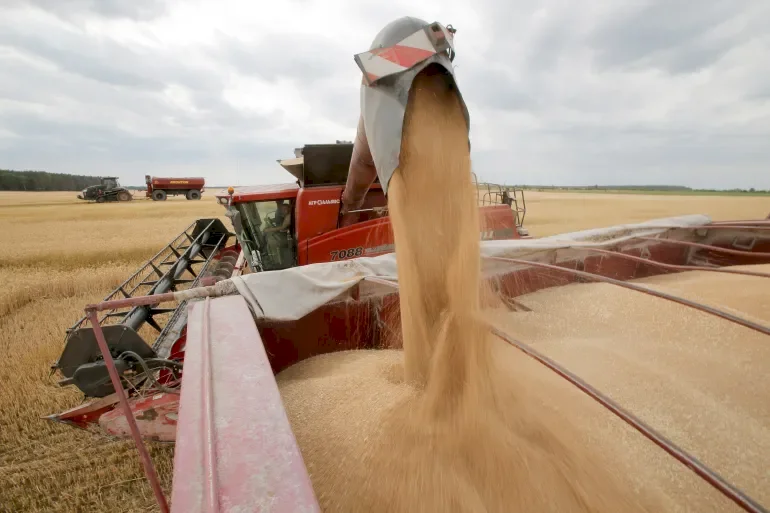
Global Food Prices Jump to Highest Level in Over Two Years
SadaNews Economics - Global prices of staple food commodities saw a remarkable surge during July, reaching their highest levels in more than two years, according to a new report by the United Nations Food and Agriculture Organization (FAO), which noted that the rise in prices of vegetable oils and meats outweighed the downward impact of falling prices for grains, dairy products, and sugar.
FAO stated in an official statement, citing its monthly report that tracks changes in the prices of a basket of globally traded food commodities, that "the average food price index reached 130.1 points in July 2025, up 1.6% from its level in June."
Although this figure is still below the historical peak recorded in March 2022 - following the comprehensive Russian invasion of Ukraine - it is the highest since February 2023, according to the report published by Reuters, which indicated that the index is currently 18.8% below that previous peak.
Beef and Sheep Meat at Record High
According to FAO's report, "the meat price index increased by 1.2% from the previous peak recorded in June, reaching 127.3 points, marking the highest level ever." This increase is primarily attributed to a noticeable rise in demand for meat imports from China and the United States.
Reuters' report highlighted a surge in U.S. imports of beef after drought reduced cattle numbers domestically, while China - despite opening an official investigation into beef imports - continued to import record quantities last year, amid growing consumer demand for this category of meat.
Conversely, pork prices saw a significant decline due to ample supply and weak demand, particularly in the European Union, while poultry prices rose slightly as major importers resumed purchases from Brazil, after the latter restored its status as "bird flu-free country," as confirmed by FAO.
Vegetable Oil Index Marks Highest Level in 3 Years
Regarding vegetable oils, FAO noted that the price index for this category increased by 7.1% month-on-month, reaching 166.8 points, the highest level recorded in 3 years.
The organization attributed this surge to "rising prices of palm oil, soybean oil, and sunflower oil, due to increased global demand and tight supply, despite falling prices of rapeseed oil as new crops reached Europe."
Grains, Dairy Products, and Sugar Register Declines
In contrast to the rise in meats and oils, grain prices experienced a tangible decline, as the FAO grain price index fell to its lowest level in nearly 5 years, driven by "seasonal pressures on wheat supplies from the Northern Hemisphere," according to the report.
The rice price index dropped by 1.8% in July, amid ample supply and a slowdown in demand for imports, while dairy product prices recorded a slight decline, the first since April 2024, as falling butter and milk powder prices compensated for the rise in cheese prices.
Regarding sugar, FAO clarified that the price index for this commodity fell for the fifth consecutive month, despite signs of improving global demand for sugar imports, as "expectations of increased production in Brazil and India outweighed the impact of this improvement in demand."
Reuters noted that FAO did not issue a new update this month regarding its estimates of global grain supply and demand, as markets continue to monitor developments in climatic and geopolitical factors affecting global food security.
Are Markets Facing a New Inflation Cycle?
Observers believe that the notable rise in meat and vegetable oil prices threatens to fuel a new inflation cycle in markets, particularly in food-importing countries, which could compound the cost of living burdens for low-income households, especially in Global South countries.
FAO data - according to Reuters - reflect a clear disparity between food commodity prices, with some categories like meats and oils following an upward trajectory, while grains, dairy products, and sugar continue a temporary downward trend.
In conclusion, Reuters emphasized that monitoring price developments over the coming months will remain contingent on several factors, the most prominent of which are climate fluctuations, geopolitical stability, and the level of global demand, particularly from the two major consumers, the U.S. and China.

Barclays: Oil Prices Could Reach $80 per Barrel

Bitcoin Falls Near $63,000 Following Attack on Iran

The Trap of High Prices: Debts Haunt Germans and Bankruptcy Knocks at Their Doors

Major Changes in the Saudi Public Investment Fund… What is Happening?

Gold Stabilizes and Heads for its Seventh Consecutive Monthly Gain

The IMF Disburses Approximately $2.3 Billion to Egypt Following Two Reviews of the "Reform...

Oil Rises Amid Expectations for Nuclear Negotiations Between Washington and Tehran
